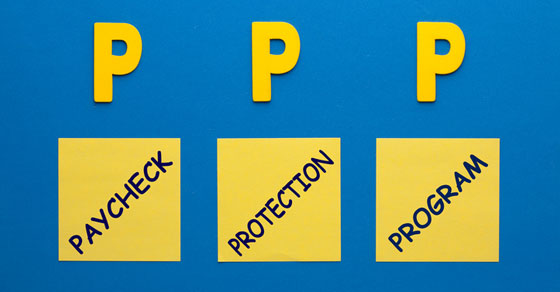
The Small Business Administration (SBA) announced that the Paycheck Protection Program (PPP) reopened the week of January 11. If you’re fortunate to get a PPP loan to help during the COVID-19 crisis (or you received one last year), you may wonder about the tax consequences.
In March of 2020, the CARES Act became law. It authorized the SBA to make loans to qualified businesses under certain circumstances. The law established the PPP, which provided up to 24 weeks of cash-flow assistance through 100% federally guaranteed loans to eligible recipients. Taxpayers could apply to have the loans forgiven to the extent their proceeds were used to maintain payroll during the COVID-19 pandemic and to cover certain other expenses.
At the end of 2020, the Consolidated Appropriations Act (CAA) was enacted to provide additional relief related to COVID-19. This law includes funding for more PPP loans, including a “second draw” for businesses that received a loan last year. It also allows businesses to claim a tax deduction for the ordinary and necessary expenses paid from the proceeds of PPP loans.
The CAA permits certain smaller businesses who received a PPP loan and experienced a 25% reduction in gross receipts to take a PPP second draw loan of up to $2 million.
To qualify for a second draw loan, a taxpayer must have taken out an original PPP Loan. In addition, prior PPP borrowers must now meet the following conditions to be eligible:
To be eligible for full PPP loan forgiveness, a business must generally spend at least 60% of the loan proceeds on qualifying payroll costs (including certain health care plan costs) and the remaining 40% on other qualifying expenses. These include mortgage interest, rent, utilities, eligible operations expenditures, supplier costs, worker personal protective equipment and other eligible expenses to help comply with COVID-19 health and safety guidelines or equivalent state and local guidelines.
Eligible entities include for-profit businesses, certain non-profit organizations, housing cooperatives, veterans’ organizations, tribal businesses, self-employed individuals, sole proprietors, independent contractors and small agricultural co-operatives.
The CARES Act didn’t address whether expenses paid with the proceeds of PPP loans could be deducted on tax returns. Last year, the IRS took the position that these expenses weren’t deductible. However, the CAA provides that expenses paid from the proceeds of PPP loans are deductible.
Generally, when a lender reduces or cancels debt, it results in cancellation of debt (COD) income to the debtor. However, the forgiveness of PPP debt is excluded from gross income. Your tax attributes (net operating losses, credits, capital and passive activity loss carryovers, and basis) wouldn’t generally be reduced on account of this exclusion.
This only covers the basics of applying for PPP loans, as well as the tax implications. Contact us if you have questions or if you need assistance in the PPP loan application or forgiveness process.
© 2021
Receive Free financial tips & Tax Alerts!
"*" indicates required fields
There are several financial and legal implications when adding a new partner to a partnership. Here’s an example to illustrate: You and your partners are planning to admit a new…
Businesses usually want to delay recognition of taxable income into future years and accelerate deductions into the current year. But when is it wise to do the opposite? And why…
Navigating the realm of capital gains and optimizing tax outcomes require strategic thinking and informed decision-making. Understanding and employing effective capital gains tax strategies is crucial for businesses contemplating asset…